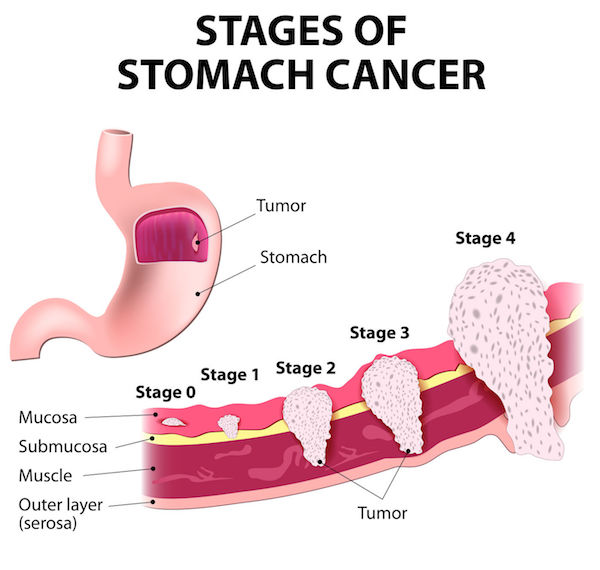Stomach cancer usually starts in the inner lining of the stomach (the mucosa) and slowly spreads out into the other layers. It tends to grow slowly over many years. Before a cancer starts, there are usually changes that take place in the mucosa that are not noticed.

Stomach cancer can spread in different ways. It can grow through the wall of the stomach and into nearby organs. It can also spread to nearby lymph nodes (bean-sized collections of immune system cells) and then spread through the lymph system. When it is more advanced, it can travel through the bloodstream to other organs like the liver, lungs, and bones.
There are different types of stomach cancer, including adenocarcinoma, lymphomas, gastrointestinal stromal tumours (often called GISTs) and carcinoid tumours.
Stomach cancer risk factors include:
- A diet high in salty and smoked foods
- A diet low in fruits and vegetables
- Eating foods contaminated with aflatoxin fungus
- A family history
- Infection with Helicobacter pylori (a bacteria that causes chronic inflammation in the stomach and is a common cause of ulcers)
- Long-term stomach inflammation
- Smoking
- Stomach polyps (masses of cells that form on the stomach’s inside lining).
What are its symptoms?
Many stomach cancer symptoms are similar to less serious conditions, so it can be difficult to detect in the early stages.
Early stage symptoms include:
- Constant indigestion
- Heartburn
- Feeling full while eating
- Feeling bloated after eating
- Feeling sick
- Pain in your stomach or breastbone (sternum)
- Difficulty swallowing (dysphagia)
- Vomiting (which may be streaked with blood).
Symptoms of more advanced stomach cancer include:
- Blood in your stools, or black stools
- Loss of appetite
- Weight loss
- Tiredness
- Lumpiness and swelling in your stomach (caused by a build-up of fluid)
- Anaemia (a reduction in red blood cells that can cause you to feel tired and out of breath)
- Yellowing of your skin and the whites of your eyes (jaundice).
Stomach cancer is usually easier to treat if it’s diagnosed early, so you should see your GP as soon as possible if you notice any of the above symptoms.
There are three grades of stomach cancer:
- Low-grade: the cancer may grow slowly
- Medium-grade: the cancer may grow faster
- High-grade: the cancer is more aggressive and likely to grow more quickly.
How is it diagnosed?
If you have symptoms that could indicate stomach cancer, consult your doctor immediately. Early detection is crucial. He/she will ask about your symptoms and examine your stomach for any lumpiness or tenderness.
If your doctor suspects stomach cancer, stomach cancer tests are needed to confirm the diagnosis. Test types include:
- Endoscopy and endoscopic ultrasound: An endoscope (is a long, thin flexible tube with a light and a video camera at the end) is used to examine the inside of your stomach.
- A barium meal X-ray or barium swallow: A liquid containing a substance called barium is used, which makes your stomach show up on an X-ray.
- Laparoscopy: In a laparoscopy, a thin viewing tube with a camera on the end (a laparoscope) will be inserted into your stomach through a small incision in the lower part of your tummy. This will examine your stomach in more detail.
- Computerised tomography (CT) or positron emission tomography (PET) scan: These take a series of X-ray images of your body. A computer then puts them together, creating a detailed picture of the inside of your body.
- Ultrasound scan: This type of scan uses high frequency sound waves to produce an image of your stomach.
Stomach cancer stages range from I to IV, becoming more severe and invasive as it progresses. By stage IV, the cancer has spread to another part of the body such as the liver or lungs
What are your treatment options?
Stomach cancer treatment will involve a multidisciplinary healthcare team, which will guide you through your cancer treatment and outline your options. Ask questions and think about all your options before deciding on your treatment.
Stomach cancer treatments depend on the type and how advanced the cancer is, as well as overall health and treatment preferences.
The main types of treatment for stomach cancer are:
- Surgery: During surgery, your surgeon works to remove the cancerous tumour and a degree of healthy tissue. He/she may also perform a subtotal gastrectomy or a total gastrectomy, which is the removal of the whole stomach.
- Stomach cancer chemotherapy: The use of drugs to kill cancer cells.
- Radiation therapy: Radiation therapy uses high-energy beams aimed at your cancer to destroy the cancer cells.
- Targeted drug therapy: Newer cancer treatments that work by targeting specific abnormalities in cancer cells.
Can it be prevented?
Stomach cancer prevention is not possible and there is no stomach cancer cure but there are precautions you can take that could lower your risk. These include:
- Don't smoke.
- Reduce the amount of salty and smoked foods you eat. Protect your stomach by limiting these foods.
- Speak to your doctor about your risk of stomach cancer, if you have an increased risk. You may consider a periodic endoscopy to look for signs.
- Eat plenty of fruit and vegetables.
For more info
Cancer Association of South Africa
IMAGE CREDIT: 123rf.com
